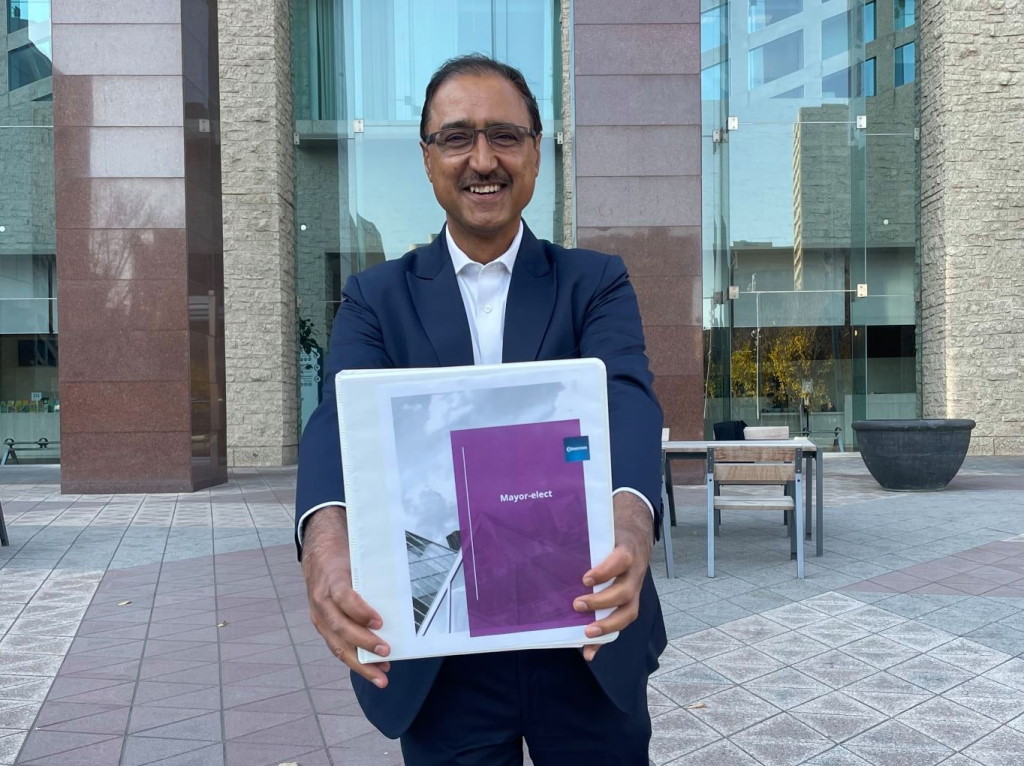Amarjeet Sohi is heading to the mayor's office with a strong belief in the power of collaboration, whether it's with other orders of government or his fellow members of city council.
While relations have been rocky between Edmonton and the provincial government under the UCP, Sohi told Speaking Municipally that his first conversation with Premier Jason Kenney was "very constructive," and he's optimistic about building a new relationship.
"We cannot just ignore the important role the province plays helping municipalities deliver infrastructure, help grow the economy, and tackle social issues," he said on Episode 152 of Taproot's civic affairs podcast. "We have no choice other than finding a way to work with the provincial government. And I have ideas."
Sohi recalled a meeting with the mayor of Halifax when he was the federal infrastructure minister, in which the mayor had brought together his council and a coalition of community leaders to make their case. That use of the "convening power" of the mayor's office impressed him, he said.
He already has a strong relationship with the federal government and Prime Minister Justin Trudeau, in whose cabinet he served from 2015 to 2019. But he's not ready to skip straight to trying an end run around the province to secure support for child care, for example, as Calgary's newly elected mayor, Jyoti Gondek, suggested recently.
"Absolutely, we will explore that option, but I think my preferred approach is going to be to make sure the province is at the table with the federal government and that they're negotiating," Sohi said.
He aims to strike a similarly collaborative tone with the 12 newly elected or re-elected councillors, who will be sworn in with him on Oct. 26.
"I really want to set the tone that collaboration is the key to success at the local level," he said. "I want my council colleagues to understand that I will be open, transparent with them, that I'm there to work with them, and I see all of us as equal."
You won't see public criticism of people he disagrees with, he said. "I don't function that way. I focus on policy. I focus on ideas. And I try to find common ground to get things done."

Amarjeet Sohi displays his "Mayor-Elect" binder outside of City Hall in a thank-you post on Facebook [facebook.com/AmarjeetSohiYEG]
One of the first things on this council's docket will be the budget. Because Edmonton has multi-year budgeting, many of the decisions have already been made, as we are heading into the fourth year of the operating budget that the previous council approved. But there is still room to make some adjustments.
As for transit, the biggest line item in the city budget, Sohi suggested he would look to other orders of government for help to deal with the prolonged decrease in ridership due to the pandemic, and he would like to restore some of the routes that were lost in the bus network redesign. But he's more interested in subsidized transit for some than free transit for all.
The police budget is another big line item. He sees an opportunity to freeze or reduce it by investing in social housing and mental health supports, but isn't keen on the idea of defunding the police.
"I don't believe in this philosophy that you need to defund one service in order to properly fund the other service," he said.
How would the city pay for these things? Sohi said this is not the time to be raising taxes, but he has some ideas that he would like to run past city manager Andre Corbould and his councillors. He suggested that negotiating a better revenue split with the province is on his list.
"Every dollar that you and I pay in property taxes, 30 cents of that dollar goes to the province," he said. "What value do we get for that 30 cents? They say that they fund education, but that goes into general revenue... So that's one area that I would like to have a conversation with the province."
Hear more from Sohi on homelessness, LRT, the Yellowhead Trail expansion, and the city's approach to truth and reconciliation in the full podcast episode. And refresh yourself on how he answered the Taproot Survey on these and many other issues.
